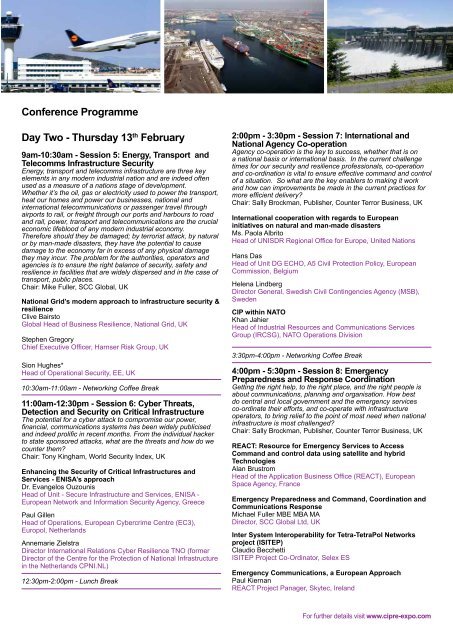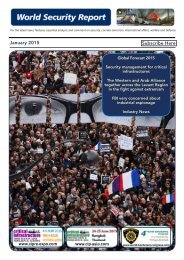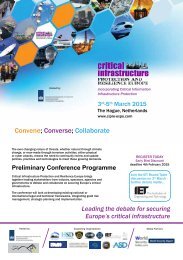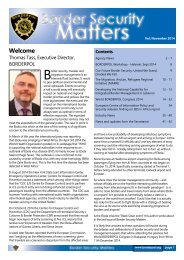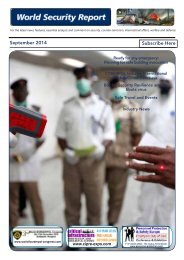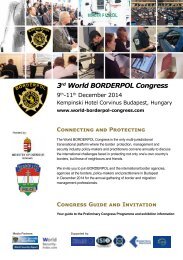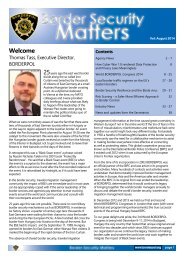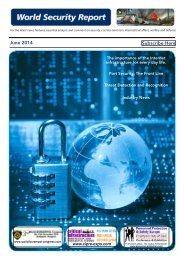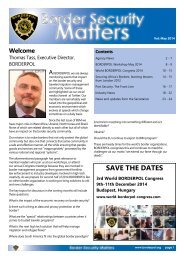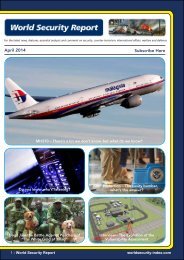Preliminary Conference Programme
Create successful ePaper yourself
Turn your PDF publications into a flip-book with our unique Google optimized e-Paper software.
<strong>Conference</strong> <strong>Programme</strong><br />
Day Two - Thursday 13 th February<br />
9am-10:30am - Session 5: Energy, Transport and<br />
Telecomms Infrastructure Security<br />
Energy, transport and telecomms infrastructure are three key<br />
elements in any modern industrial nation and are indeed often<br />
used as a measure of a nations stage of development.<br />
Whether it’s the oil, gas or electricity used to power the transport,<br />
heat our homes and power our businesses, national and<br />
international telecommunications or passenger travel through<br />
airports to rail, or freight through our ports and harbours to road<br />
and rail, power, transport and telecommunications are the crucial<br />
economic lifeblood of any modern industrial economy.<br />
Therefore should they be damaged; by terrorist attack, by natural<br />
or by man-made disasters, they have the potential to cause<br />
damage to the economy far in excess of any physical damage<br />
they may incur. The problem for the authorities, operators and<br />
agencies is to ensure the right balance of security, safety and<br />
resilience in facilities that are widely dispersed and in the case of<br />
transport, public places.<br />
Chair: Mike Fuller, SCC Global, UK<br />
National Grid’s modern approach to infrastructure security &<br />
resilience<br />
Clive Bairsto<br />
Global Head of Business Resilience, National Grid, UK<br />
Stephen Gregory<br />
Chief Executive Officer, Harnser Risk Group, UK<br />
Sion Hughes*<br />
Head of Operational Security, EE, UK<br />
10:30am-11:00am - Networking Coffee Break<br />
11:00am-12:30pm - Session 6: Cyber Threats,<br />
Detection and Security on Critical Infrastructure<br />
The potential for a cyber attack to compromise our power,<br />
financial, communications systems has been widely publicised<br />
and indeed prolific in recent months. From the individual hacker<br />
to state sponsored attacks, what are the threats and how do we<br />
counter them?<br />
Chair: Tony Kingham, World Security Index, UK<br />
Enhancing the Security of Critical Infrastructures and<br />
Services - ENISA’s approach<br />
Dr. Evangelos Ouzounis<br />
Head of Unit - Secure Infrastructure and Services, ENISA -<br />
European Network and Information Security Agency, Greece<br />
Paul Gillen<br />
Head of Operations, European Cybercrime Centre (EC3),<br />
Europol, Netherlands<br />
Annemarie Zielstra<br />
Director International Relations Cyber Resilience TNO (former<br />
Director of the Centre for the Protection of National Infrastructure<br />
in the Netherlands CPNI.NL)<br />
12:30pm-2:00pm - Lunch Break<br />
2:00pm - 3:30pm - Session 7: International and<br />
National Agency Co-operation<br />
Agency co-operation is the key to success, whether that is on<br />
a national basis or international basis. In the current challenge<br />
times for our security and resilience professionals, co-operation<br />
and co-ordination is vital to ensure effective command and control<br />
of a situation. So what are the key enablers to making it work<br />
and how can improvements be made in the current practices for<br />
more efficient delivery?<br />
Chair: Sally Brockman, Publisher, Counter Terror Business, UK<br />
International cooperation with regards to European<br />
initiatives on natural and man-made disasters<br />
Ms. Paola Albrito<br />
Head of UNISDR Regional Office for Europe, United Nations<br />
Hans Das<br />
Head of Unit DG ECHO, A5 Civil Protection Policy, European<br />
Commission, Belgium<br />
Helena Lindberg<br />
Director General, Swedish Civil Contingencies Agency (MSB),<br />
Sweden<br />
CIP within NATO<br />
Khan Jahier<br />
Head of Industrial Resources and Communications Services<br />
Group (IRCSG), NATO Operations Division<br />
3:30pm-4:00pm - Networking Coffee Break<br />
4:00pm - 5:30pm - Session 8: Emergency<br />
Preparedness and Response Coordination<br />
Getting the right help, to the right place, and the right people is<br />
about communications, planning and organisation. How best<br />
do central and local government and the emergency services<br />
co-ordinate their efforts, and co-operate with infrastructure<br />
operators, to bring relief to the point of most need when national<br />
infrastructure is most challenged?<br />
Chair: Sally Brockman, Publisher, Counter Terror Business, UK<br />
REACT: Resource for Emergency Services to Access<br />
Command and control data using satellite and hybrid<br />
Technologies<br />
Alan Brustrom<br />
Head of the Application Business Office (REACT), European<br />
Space Agency, France<br />
Emergency Preparedness and Command, Coordination and<br />
Communications Response<br />
Michael Fuller MBE MBA MA<br />
Director, SCC Global Ltd, UK<br />
Inter System Interoperability for Tetra-TetraPol Networks<br />
project (ISITEP)<br />
Claudio Becchetti<br />
ISITEP Project Co-Ordinator, Selex ES<br />
Emergency Communications, a European Approach<br />
Paul Kiernan<br />
REACT Project Panager, Skytec, Ireland<br />
For further details visit www.cipre-expo.com


